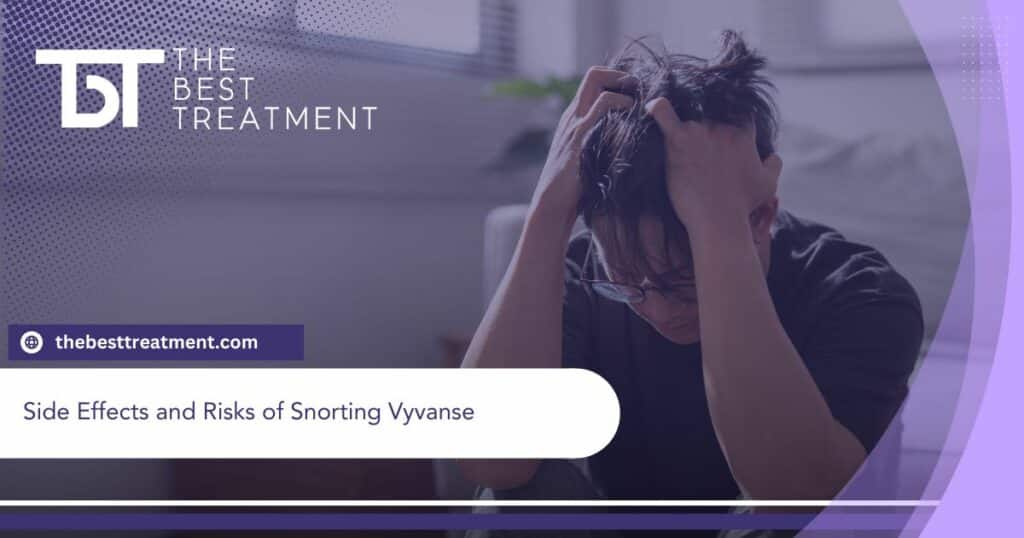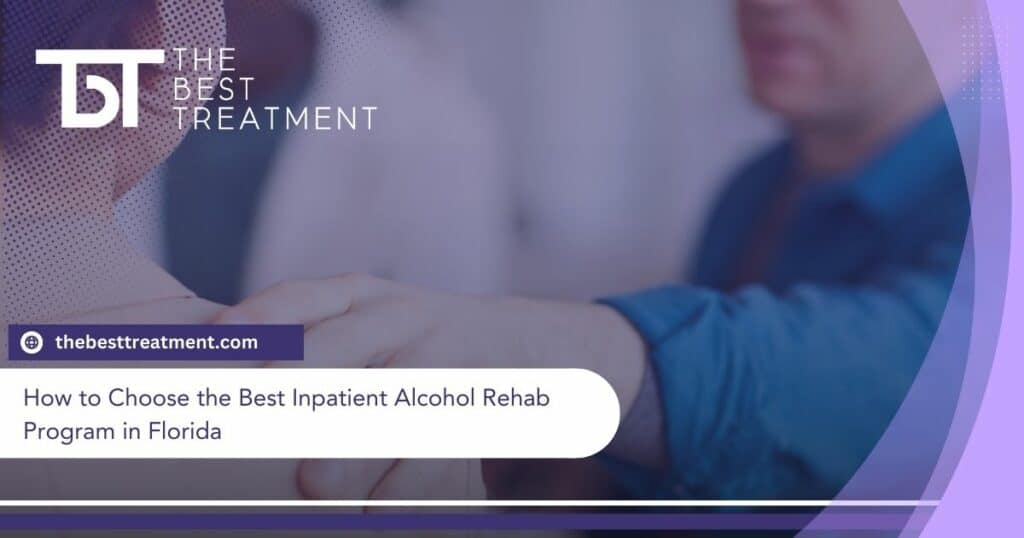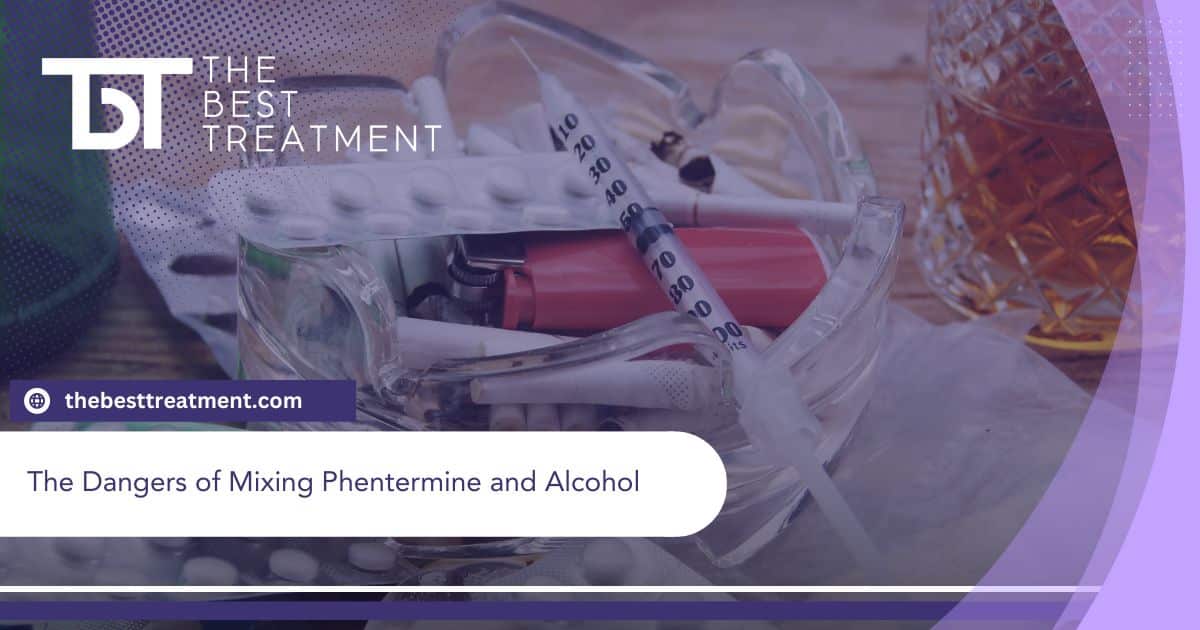Table of Contents
Phentermine is a prescription weight loss medication. Each year, doctors in the United States write more than 2 million prescriptions for phentermine, making it one of the most commonly prescribed medications for weight loss.
People who take phentermine must avoid drinking alcohol while using this drug. Mixing phentermine and alcohol can have unintended, sometimes dangerous side effects. However, alcohol is widely available in most areas of the country, and most adults report drinking at least occasionally.
Understanding the risk of mixing alcohol and phentermine is crucial. This article will detail how alcohol and phentermine interact to cause dangerous side effects and how to find help if you cannot control your drinking on your own.
Reach out to the team at The Best Treatment to learn more about the side effects of phentermine and alcohol use or to explore our holistic addiction treatment programs.
The Effects and Risks of Phentermine
Phentermine is a prescription stimulant drug that works to suppress appetite. People who take phentermine often consume less food because they are not as hungry, which can result in weight loss.
Phentermine is distributed under several brand names, including:
- Adipex-P
- Ionamin
- Phentride
- Teramine
In addition to suppressing the appetite, phentermine can cause other side effects. These include:
- Dry mouth
- Diarrhea
- Headache
- High blood pressure
- Changes in libido
- Psychosis
- Pulmonary hypertension
- Heart disease
- Rash
- Tremors
- Overstimulation
The Drug Enforcement Administration (DEA) classifies phentermine as a Schedule IV controlled substance. This designation means that phentermine has the potential for misuse, physical dependence, and addiction. People may take phentermine differently than prescribed or recreationally for its stimulant effects.
People who use phentermine differently than their doctor prescribes may become addicted to it. Those taking this drug should be aware of the signs of abuse and addiction and seek treatment to stop using it.
Signs of phentermine abuse include:
- Unexpected weight loss
- Ingesting phentermine differently than prescribed, such as crushing and snorting pills
- Doctor shopping–meaning having multiple prescriptions from more than one doctor
- Buying or stealing phentermine from others
Long-term phentermine abuse can lead to serious side effects, including:
- Insomnia
- Irritability
- Hyperactivity
- Skin problems
- Changes in personality
- Psychosis
People who exhibit signs of phentermine abuse should seek treatment right away to avoid worsening consequences or addiction.
One of the most significant risks of phentermine abuse is the potential for overdose. Overdosing on prescription drugs, including stimulants like phentermine, is a medical emergency. Symptoms of a phentermine overdose include:
- Stiff muscles
- Panic
- Confusion
- Rapid breathing
- Abnormal heart rhythms
- Increased heart rate
- Nausea and vomiting
- Diarrhea
- Seizures
- Coma
- Death
If someone near you is experiencing an overdose, call 911 right away. Wait with the person until help arrives.
Mixing Phentermine and Alcohol: Understanding the Risks
Medical professionals advise against drinking alcohol while taking phentermine. Many possible complications and side effects may happen if you mix phentermine and alcohol.
Here are some of the risks and side effects of mixing phentermine and alcohol.
Increased risk of alcohol overdose
Alcohol affects the body by reducing activity in the central nervous system (CNS). Taking stimulants like phentermine while drinking can cover up some of the symptoms of alcohol intoxication. People may have to drink more to feel “buzzed,” increasing their risk for alcohol overdose.
Weight gain
People typically take phentermine to help them lose weight. Alcohol can lower inhibitions, causing people to eat more or consume calorie-dense foods. Alcohol itself is high in calories, which can contribute to weight gain.
Cardiovascular issues
The combination of phentermine and alcohol can cause cardiovascular symptoms. When mixing these substances, people may experience increased heart rate, blood pressure, and chest pain.
Central nervous system (CNS) issues
Phentermine and alcohol have opposing effects on the central nervous system. People may experience CNS-related symptoms when mixing them, including:
- Dizziness
- Depression
- Poor concentration
- Tiredness
People who use phentermine must avoid alcohol to reduce the risk of unwanted short-term side effects and dangerous complications.
Do I Need Substance Abuse Treatment?
If your doctor or medical professional has told you to stop drinking while taking medication, but you can’t control your alcohol use, you may require professional support and treatment to regain control.
Similarly, if you misuse phentermine and exhibit signs of addiction, you may need support and treatment to stop using it safely.
Recognizing the signs of substance abuse and addiction is the first step in getting the help you need. Here are some signs of substance abuse to watch for:
- You need to use more of a substance to get the desired effects
- You spend a lot of time thinking about, getting, and using a substance
- You experience withdrawal symptoms if you stop taking the substance
- You want to stop using a substance, but you can’t do it on your own
Contact the team at The Best Treatment to learn about our comprehensive addiction treatment programs or to schedule an intake assessment.
Medically Reviewed: September 25, 2019

All of the information on this page has been reviewed and verified by a certified addiction professional.










